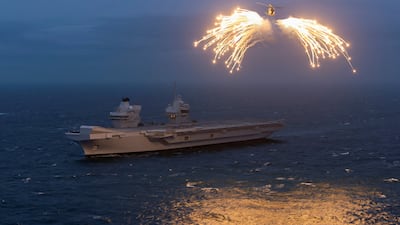Two UK government ministers, Anne-Marie Trevelyan and Tom Tugendhat, have urged the Prime Minister Rishi Sunak to significantly raise defence spending to at least 2.5 per cent of Gross Domestic Product (GDP), up from the current level of just over 2 per cent.
This appeal comes amid growing concerns from Conservative MPs and military experts regarding Chancellor Jeremy Hunt's recent spring budget, which failed to include additional defence funding.
The ministers' call reflects the urgency of responding to what Defence Secretary Grant Shapps has described as a “prewar world”.
Ms Trevelyan, a Foreign Office Minister and former defence minister, alongside Mr Tugendhat, the Security Minister and an experienced soldier, made their case in an online article unexpectedly not approved by Downing Street.
Posted on Ms Trevelyan's LinkedIn page, the article argues for the UK to lead by enhancing its defence and security budget beyond the current spending, highlighting the initial efforts made by former defence secretary Ben Wallace and former prime minister Boris Johnson.
They emphasised that while previous efforts remedied funding shortfalls, growth in defence spending is now critically needed.
The ministers outlined key investment areas, including the UK's nuclear deterrent, expansion of the Royal Navy, additional weapons and ammunition, and faster development of new fighter jets.
They stressed the investment would not only protect the UK's future economic security but also promote growth in the nation's defence industrial base.
“The sad truth is that the world is no longer benign,” they said.
“Protecting ourselves requires investment. And effective investment means that our industrial complex must grow and strengthen at much greater pace than at present.
“We cannot turn on the complex platforms and weapons which ensure military advantage overnight. We must start that growth now, invest at pace to support our allies and stay ahead of our adversaries.”
The context of this call includes significant increases in defence budgets by global powers such as China and Russia, with China announcing a 7.2 per cent rise in its defence budget to $230 billion (£179 billion), and Russia dedicating 40 per cent of its expenditure to defence and security.
In a Sunday Times interview, Mr Sunak defended his record on funding the military.
“I would just point to our record here as chancellor when I oversaw the largest increase in the defence budget since the end of the Cold War with a £24 billion uplift,” he said.
“The whole point is, we recognised that the world that we’re living in was becoming more dangerous, and we had to invest more to protect the country against that.”
Meanwhile, the UK's defence budget has increased by 28 per cent over the last decade, from £43 billion to £55 billion.
Ms Trevelyan and Mr Tugendhat's appeal for increased defence spending highlights the strategic necessity for Europe to secure its borders, especially as the US pivots towards addressing the challenge posed by China.
COMPANY%20PROFILE
%3Cp%3E%3Cstrong%3EName%3A%3C%2Fstrong%3E%20Floward%0D%3Cbr%3E%3Cstrong%3EBased%3A%20%3C%2Fstrong%3ERiyadh%2C%20Saudi%20Arabia%0D%3Cbr%3E%3Cstrong%3EFounders%3A%20%3C%2Fstrong%3EAbdulaziz%20Al%20Loughani%20and%20Mohamed%20Al%20Arifi%0D%3Cbr%3E%3Cstrong%3ESector%3A%20%3C%2Fstrong%3EE-commerce%0D%3Cbr%3E%3Cstrong%3ETotal%20funding%3A%20%3C%2Fstrong%3EAbout%20%24200%20million%0D%3Cbr%3E%3Cstrong%3EInvestors%3A%20%3C%2Fstrong%3EAljazira%20Capital%2C%20Rainwater%20Partners%2C%20STV%20and%20Impact46%0D%3Cbr%3E%3Cstrong%3ENumber%20of%20employees%3A%20%3C%2Fstrong%3E1%2C200%3C%2Fp%3E%0A
Desert Warrior
Starring: Anthony Mackie, Aiysha Hart, Ben Kingsley
Director: Rupert Wyatt
Rating: 3/5
What vitamins do we know are beneficial for living in the UAE
Vitamin D: Highly relevant in the UAE due to limited sun exposure; supports bone health, immunity and mood.
Vitamin B12: Important for nerve health and energy production, especially for vegetarians, vegans and individuals with absorption issues.
Iron: Useful only when deficiency or anaemia is confirmed; helps reduce fatigue and support immunity.
Omega-3 (EPA/DHA): Supports heart health and reduces inflammation, especially for those who consume little fish.
Tell-tale signs of burnout
- loss of confidence and appetite
- irritability and emotional outbursts
- sadness
- persistent physical ailments such as headaches, frequent infections and fatigue
- substance abuse, such as smoking or drinking more
- impaired judgement
- excessive and continuous worrying
- irregular sleep patterns
Tips to help overcome burnout
Acknowledge how you are feeling by listening to your warning signs. Set boundaries and learn to say ‘no’
Do activities that you want to do as well as things you have to do
Undertake at least 30 minutes of exercise per day. It releases an abundance of feel-good hormones
Find your form of relaxation and make time for it each day e.g. soothing music, reading or mindful meditation
Sleep and wake at the same time every day, even if your sleep pattern was disrupted. Without enough sleep condition such as stress, anxiety and depression can thrive.
Napoleon
%3Cp%3E%3Cstrong%3EDirector%3C%2Fstrong%3E%3A%20Ridley%20Scott%3Cbr%3E%3Cstrong%3EStars%3C%2Fstrong%3E%3A%20Joaquin%20Phoenix%2C%20Vanessa%20Kirby%2C%20Tahar%20Rahim%3Cbr%3E%3Cstrong%3ERating%3C%2Fstrong%3E%3A%202%2F5%3Cbr%3E%3Cbr%3E%3C%2Fp%3E%0A
TWISTERS
Director: Lee Isaac Chung
Starring: Glen Powell, Daisy Edgar-Jones, Anthony Ramos
Rating: 2.5/5
LAST-16 FIXTURES
Sunday, January 20
3pm: Jordan v Vietnam at Al Maktoum Stadium, Dubai
6pm: Thailand v China at Hazza bin Zayed Stadium, Al Ain
9pm: Iran v Oman at Mohamed bin Zayed Stadium, Abu Dhabi
Monday, January 21
3pm: Japan v Saudi Arabia at Sharjah Stadium
6pm: Australia v Uzbekistan at Khalifa bin Zayed Stadium, Al Ain
9pm: UAE v Kyrgyzstan at Zayed Sports City Stadium, Abu Dhabi
Tuesday, January 22
5pm: South Korea v Bahrain at Rashid Stadium, Dubai
8pm: Qatar v Iraq at Al Nahyan Stadium, Abu Dhabi
Classification of skills
A worker is categorised as skilled by the MOHRE based on nine levels given in the International Standard Classification of Occupations (ISCO) issued by the International Labour Organisation.
A skilled worker would be someone at a professional level (levels 1 – 5) which includes managers, professionals, technicians and associate professionals, clerical support workers, and service and sales workers.
The worker must also have an attested educational certificate higher than secondary or an equivalent certification, and earn a monthly salary of at least Dh4,000.












